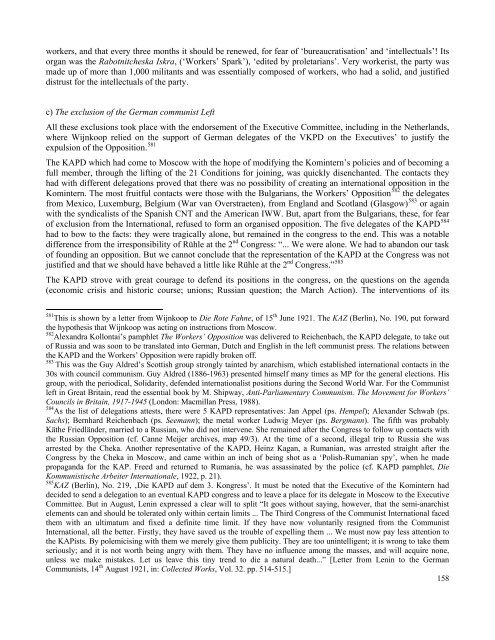The German-Dutch Communist Left - Libcom
The German-Dutch Communist Left - Libcom
The German-Dutch Communist Left - Libcom
Create successful ePaper yourself
Turn your PDF publications into a flip-book with our unique Google optimized e-Paper software.
workers, and that every three months it should be renewed, for fear of ‘bureaucratisation’ and ‘intellectuals’! Its<br />
organ was the Rabotnitcheska Iskra, (‘Workers’ Spark’), ‘edited by proletarians’. Very workerist, the party was<br />
made up of more than 1,000 militants and was essentially composed of workers, who had a solid, and justified<br />
distrust for the intellectuals of the party.<br />
c) <strong>The</strong> exclusion of the <strong>German</strong> communist <strong>Left</strong><br />
All these exclusions took place with the endorsement of the Executive Committee, including in the Netherlands,<br />
where Wijnkoop relied on the support of <strong>German</strong> delegates of the VKPD on the Executives’ to justify the<br />
expulsion of the Opposition. 581<br />
<strong>The</strong> KAPD which had come to Moscow with the hope of modifying the Komintern’s policies and of becoming a<br />
full member, through the lifting of the 21 Conditions for joining, was quickly disenchanted. <strong>The</strong> contacts they<br />
had with different delegations proved that there was no possibility of creating an international opposition in the<br />
Komintern. <strong>The</strong> most fruitful contacts were those with the Bulgarians, the Workers’ Opposition 582 the delegates<br />
from Mexico, Luxemburg, Belgium (War van Overstraeten), from England and Scotland (Glasgow) 583 or again<br />
with the syndicalists of the Spanish CNT and the American IWW. But, apart from the Bulgarians, these, for fear<br />
of exclusion from the International, refused to form an organised opposition. <strong>The</strong> five delegates of the KAPD 584<br />
had to bow to the facts: they were tragically alone, but remained in the congress to the end. This was a notable<br />
difference from the irresponsibility of Rühle at the 2 nd Congress: “... We were alone. We had to abandon our task<br />
of founding an opposition. But we cannot conclude that the representation of the KAPD at the Congress was not<br />
justified and that we should have behaved a little like Rühle at the 2 nd Congress.” 585<br />
<strong>The</strong> KAPD strove with great courage to defend its positions in the congress, on the questions on the agenda<br />
(economic crisis and historic course; unions; Russian question; the March Action). <strong>The</strong> interventions of its<br />
581 This is shown by a letter from Wijnkoop to Die Rote Fahne, of 15 th June 1921. <strong>The</strong> KAZ (Berlin), No. 190, put forward<br />
the hypothesis that Wijnkoop was acting on instructions from Moscow.<br />
582 Alexandra Kollontai’s pamphlet <strong>The</strong> Workers’ Opposition was delivered to Reichenbach, the KAPD delegate, to take out<br />
of Russia and was soon to be translated into <strong>German</strong>, <strong>Dutch</strong> and English in the left communist press. <strong>The</strong> relations between<br />
the KAPD and the Workers’ Opposition were rapidly broken off.<br />
583<br />
This was the Guy Aldred’s Scottish group strongly tainted by anarchism, which established international contacts in the<br />
30s with council communism. Guy Aldred (1886-1963) presented himself many times as MP for the general elections. His<br />
group, with the periodical, Solidarity, defended internationalist positions during the Second World War. For the <strong>Communist</strong><br />
left in Great Britain, read the essential book by M. Shipway, Anti-Parliamentary Communism. <strong>The</strong> Movement for Workers’<br />
Councils in Britain, 1917-1945 (London: Macmillan Press, 1988).<br />
584 As the list of delegations attests, there were 5 KAPD representatives: Jan Appel (ps. Hempel); Alexander Schwab (ps.<br />
Sachs); Bernhard Reichenbach (ps. Seemann); the metal worker Ludwig Meyer (ps. Bergmann). <strong>The</strong> fifth was probably<br />
Käthe Friedländer, married to a Russian, who did not intervene. She remained after the Congress to follow up contacts with<br />
the Russian Opposition (cf. Canne Meijer archives, map 49/3). At the time of a second, illegal trip to Russia she was<br />
arrested by the Cheka. Another representative of the KAPD, Heinz Kagan, a Rumanian, was arrested straight after the<br />
Congress by the Cheka in Moscow, and came within an inch of being shot as a ‘Polish-Rumanian spy’, when he made<br />
propaganda for the KAP. Freed and returned to Rumania, he was assassinated by the police (cf. KAPD pamphlet, Die<br />
Kommunistische Arbeiter Internationale, 1922, p. 21).<br />
585 KAZ (Berlin), No. 219, ‚Die KAPD auf dem 3. Kongress’. It must be noted that the Executive of the Komintern had<br />
decided to send a delegation to an eventual KAPD congress and to leave a place for its delegate in Moscow to the Executive<br />
Committee. But in August, Lenin expressed a clear will to split “It goes without saying, however, that the semi-anarchist<br />
elements can and should be tolerated only within certain limits ... <strong>The</strong> Third Congress of the <strong>Communist</strong> International faced<br />
them with an ultimatum and fixed a definite time limit. If they have now voluntarily resigned from the <strong>Communist</strong><br />
International, all the better. Firstly, they have saved us the trouble of expelling them ... We must now pay less attention to<br />
the KAPists. By polemicising with them we merely give them publicity. <strong>The</strong>y are too unintelligent; it is wrong to take them<br />
seriously; and it is not worth being angry with them. <strong>The</strong>y have no influence among the masses, and will acquire none,<br />
unless we make mistakes. Let us leave this tiny trend to die a natural death...” [Letter from Lenin to the <strong>German</strong><br />
<strong>Communist</strong>s, 14 th August 1921, in: Collected Works, Vol. 32. pp. 514-515.]<br />
158
















